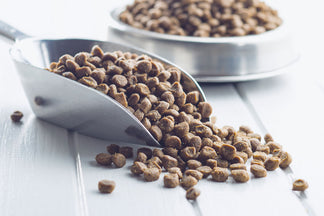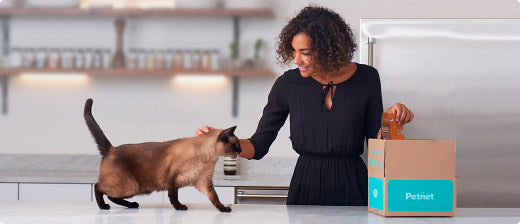Given the way that the pet food industry operates as of today, preservatives are generally necessary to keep the food products fresh and safe for consumption. But not all preservatives are created equal; while some are natural and can have some health benefits, others are chemicals that can cause harm to a pet.
Why Preservatives?
Preservatives are used to extend the shelf life of pet food products. They are also an important part of the pet food recipe due to the way the pet food makes it way from the manufacturer to the pet. The pet food industry commonly ships products in large, non-refrigerated packages, and produces the pet food in large batches, well in advance of sales demand. Furthermore, pet food is normally sold by the food manufacturer to a pet food distributor, who then sells to a pet food retailer, who in turn eventually sells it to the consumer. Thus, it can take several months (and longer) before a batch of pet food is actually eaten by the pet. Without some type of preservative, the food will likely go bad.
The Good and the Bad
Like other pet food ingredients, preservatives come in various forms. Some are natural and can actually provide health benefits. Many are artificial and at best, provide nothing nutritional, and at worst, are chemicals that you probably don’t want your pet to ingest.
Good Preservatives
Most natural preservatives are some form of anti-oxidant / vitamin. Thus, using these as preservatives kill two birds with one stone—they both extend the product’s shelf life and add the benefits of anti-oxidants (e.g anti-inflammatory) as well. Commonly used natural preservatives include:
- Mixed Tocopherols (Vitamin E)
- Forms of Vitamin C including Ascorbic Acid
- Rosemary (and extract)
- Sage (and extract)
- Clove (and extract)
Bad Preservatives
On the other hand, there are many artificial preservatives that are still being used in pet food. Some of these are banned for human consumption and even linked to cancer. Here is a list of some of the common ones to avoid.
- Ethoxyquin – this is a pesticide and has been linked to cancer. Ethoyquin is sometimes used in some meal products so it can sometimes be hidden from the ingredient list.
- Propylene glycol- this is an ingredient in anti-freeze.
- Butylated hydroxyanisole (BHA) and Butylated hydroxytoluene (BHT) – both are suspected of being cancer causing.
- Tertiary Butylhydroquinone (TBHQ )- a form of butane that is used to make varnish and resins.
- Sodium Metabisulphite- a bleaching agent.
Natural preservatives might not extend the shelf life of pet food for as long as the chemical preservatives do. Still, why would you use a pet food that needed to be kept fresh by the use of chemical ingredients? If a pet food requires chemicals to stay fresh, perhaps the food is not worthy of your pet to begin with.
The SmartFeeder’s pet food analysis algorithms will alert a pet owner if their pet’s food contains the above mentioned chemical preservatives, thereby making it simple to choose the best food possible for a pet. Remember, when in doubt, choose natural over artificial because a pet’s body was meant to consume things found in nature, not things made in the laboratory.


 Food
Food
 Food
Food
 Food
Food
